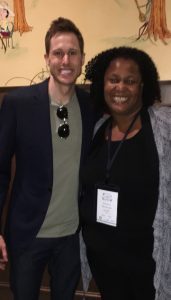Would you want them? Would you wear them?
I’m typing this blog post looking through my Coach glasses in my comfy Michael Kors sweater feeling a little… miffed. I think miffed is the right word. (Miffed: put into an irritable mood, especially by an offending incident.) I feel like what I get up and do every day, what I love to do – isn’t cool.
Welcome to 2016. A profound era where everything and everyone is trying to make us feel inadequate at every turn. Growing up in the 80’s and 90’s we had fads of course, i.e. Starter Jackets, Reebok Pump and HyperColor Shirts. But we didn’t have The Kardashian’s telling us what’s cool and what’s not.
This got me thinking. If Tom Ford had his own brand of hearing aid, would it be cool to have them? Would hearing aids becomes sexy then?
If Apple created an iHear hearing aid, would you sleep outside my office to be the first of your friends to have one?
I get this profound feeling that YES! People would actually want to do something about their hearing loss and wear a hearing aid. I wouldn’t have to try to convince you that your quality of life would be improved significantly by hearing your loved ones loud and clear. You would want to wear hearing aids because its cool. Its trendy. Your friend Jill already has them and wears them at the gym, and they sync with her iPhone and let her know her heart rate.
Those with hearing loss would seek them out and that those without hearing loss would want to wear them anyways (just like its fun, personal and stylish to wear designer eyeglass frames without a need for vision correction).
Many people are under the understanding that hearing aids are the big squealing ugly beige machines that their grandpa keeps in the kitchen junk drawer. Hearing aids may just be the last ‘un-cool’ piece of technology out there. And there’s no reason for that really. Hearing loss is something that happens to a great many people, many of whom are infants, children, teenagers, young adults. Yet when you think of how hearing aids are perceived in our society, you think of Alma in the Sister Act movies (a la ‘Hey Alma! Check your battery!’). Hearing aids are a pain in the butt. I mean, you actually have to put them in your ears and that’s such a hassle. Ugh, the tiny batteries need to be changed once a week – who has time to do that when you also have to plug in your phone every night?
A quick Google search on simply ‘Hearing Aids’ brings us the webpages of AARP and The Mayo Clinic. Do another Google Search for eyeglasses and this comes up:
[av_image src=’http://hearinganddizzy.ca/wp-content/uploads/2016/05/Capture-1.jpg’ attachment=’1097′ attachment_size=’full’ align=’center’ styling=” hover=” link=” target=” caption=” font_size=” appearance=” overlay_opacity=’0.4′ overlay_color=’#000000′ overlay_text_color=’#ffffff’ animation=’no-animation’][/av_image]
See what I’m talking about there? Vision correction is stylish, fashionable. There is no perceived stigma associated with vision correction anymore like Steve Urkel on Family Matters. It’s personalized. Hearing correction? It’s certainly not perceived that way – YET! The numbers are kind of astounding: 60% of the population has a treatable vision loss, while 20% of the population admits freely to hearing difficulty.
However, there’s another stat in here that you can’t see: The average person who has a hearing loss waits 7 years to treat it, i.e. those with hearing loss who are in denial and pretending to hear perfectly well are not a part of the aforementioned 20%. Grandpa, that’s you. I don’t mumble at all!
Again, the question begs… what do eyeglasses have that hearing aids do not? Why do Oakley, Nike and Calvin Klein not have a piece of the hearing aid pie? (Other than because there’s a technology involved, and an adjustment period to hearing aids at the brain level)
Because (despite it being very untrue) hearing aids are for old people and no one wants to accept that they are aging. Hearing aids are a nuisance. Hearing aids are ugly. Hearing loss carries a ‘less than’ stigma. No one deemed ‘cool’ by society wears hearing aids and if they do, they are beige and blend in, because – for shame! other people should see them!
Well, hear this! A Denmark based company with a Canadian presence called GN Resound is going where no hearing aid manufacturer has gone before. They’re trying to cap into that ‘allure’ of technology with the Linx²… they work with your iPhone and have an app, they are nano-coated and water resistant. The product is cool and hip and stylish. Except it isn’t. Because its still taking people 7 years to admit to their hearing loss and come in to see for themselves how the technology has improved.
Now, all that Resound needs is a George Clooney walking the red carpet with an Ocean Blue (see what I did there?) piece of technology sitting snugly behind his ears for all the word to see. For an Anderson Cooper to declare the Linx² the greatest in all the land. For a Taylor Swift to state unequivocally that hers were the inspiration for writing a new hit song.
Until that happens: You don’t want hearing aids. Heck – you don’t need them. You’re perfectly fine with society telling you that hearing loss makes you look old, feel old, that you lack in something because your hearing isn’t perfect. You don’t need to see the audiologist because you already know what he or she will say and you don’t think hearing aids can help you.
May is Better Speech & Hearing Month. Don’t be the statistic who waits 7 years to look seek improved communication with your loved ones. Come visit our Doctors of Audiology and finally turn that TV down. Imagine all the experiences that you’ll miss out on in those 7 years. It’s a long time. You wouldn’t go 7 years without seeing your loved ones properly, would you?

 We’re please to announce that Bernice McKenzie is part of the DrCliffAud Approved Provider Network!!
We’re please to announce that Bernice McKenzie is part of the DrCliffAud Approved Provider Network!! Do you know someone who’s life would be improved by improved hearing? WE WANT TO KNOW!
Do you know someone who’s life would be improved by improved hearing? WE WANT TO KNOW!
